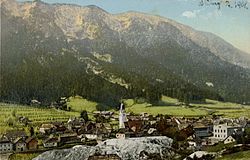This article needs additional citations for verification .(September 2014) |
Bad Bleiberg | |
|---|---|
 | |
| Coordinates: 46°37′29″N13°41′09″E / 46.62472°N 13.68583°E | |
| Country | Austria |
| State | Carinthia |
| District | Villach-Land |
| Government | |
| • Mayor | Christian Hecher (Ind.) |
| Area | |
• Total | 44.81 km2 (17.30 sq mi) |
| Elevation | 902 m (2,959 ft) |
| Population (2018-01-01) [2] | |
• Total | 2,283 |
| • Density | 51/km2 (130/sq mi) |
| Time zone | UTC+1 (CET) |
| • Summer (DST) | UTC+2 (CEST) |
| Postal code | 9530, 9531 |
| Area code | 04244 |
| Website | www.bad-bleiberg.at |
Bad Bleiberg (Slovene : Plajberk pri Beljaku) is a market town in the district of Villach-Land, in Carinthia, Austria. Originally a mining area, especially for lead (German : Blei), Bad Bleiberg today due to its hot springs is a spa town. [3]


